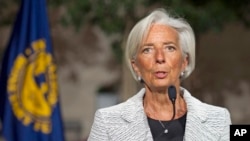The International Monetary Fund has approved a two-year, $17 billion aid program for cash-strapped Ukraine, as the Kyiv government struggles to maintain political stability in eastern regions near the Russian border.
The IMF's executive board approval, announced Wednesday, clears the way for the immediate disbursement of $3.2 billion needed to prevent Kyiv from debt default as it teeters on the brink of bankruptcy.
The loan package also paves the way for Ukraine to receive an additional $15 billion pledged by the World Bank, the European Union, Japan, Canada and the United States.
Ukraine - under pressure from international creditors - is expected to use part of the initial disbursement to pay down a $2.2 billion debt owed Moscow for natural gas purchases. Russia has in the past threatened to cut off fuel supplies, and - as relations have deteriorated in recent months - raised the price of gas to its neighbor by about 80 percent.
The IMF assistance, pledged earlier this year, was predicated on widespread economic reforms in Ukraine, including tax hikes, wage freezes and cuts in social aid.
Interim Prime Minister Arseniy Yatsenyuk has pledged to implement the reforms, including a fuel hike that is expected to rile Ukrainian consumers and stir widespread political controversy.
Ukraine, a country of 46 million residents, has been rocked by turmoil since the Russian parliament in March voted overwhelmingly to annex the Crimean peninsula. That move, widely condemned in the West, came after months of unrest in Kyiv and a push by separatists in Ukraine's Russian-speaking east to join Russia.
The IMF's executive board approval, announced Wednesday, clears the way for the immediate disbursement of $3.2 billion needed to prevent Kyiv from debt default as it teeters on the brink of bankruptcy.
The loan package also paves the way for Ukraine to receive an additional $15 billion pledged by the World Bank, the European Union, Japan, Canada and the United States.
Ukraine - under pressure from international creditors - is expected to use part of the initial disbursement to pay down a $2.2 billion debt owed Moscow for natural gas purchases. Russia has in the past threatened to cut off fuel supplies, and - as relations have deteriorated in recent months - raised the price of gas to its neighbor by about 80 percent.
The IMF assistance, pledged earlier this year, was predicated on widespread economic reforms in Ukraine, including tax hikes, wage freezes and cuts in social aid.
Interim Prime Minister Arseniy Yatsenyuk has pledged to implement the reforms, including a fuel hike that is expected to rile Ukrainian consumers and stir widespread political controversy.
Ukraine, a country of 46 million residents, has been rocked by turmoil since the Russian parliament in March voted overwhelmingly to annex the Crimean peninsula. That move, widely condemned in the West, came after months of unrest in Kyiv and a push by separatists in Ukraine's Russian-speaking east to join Russia.







